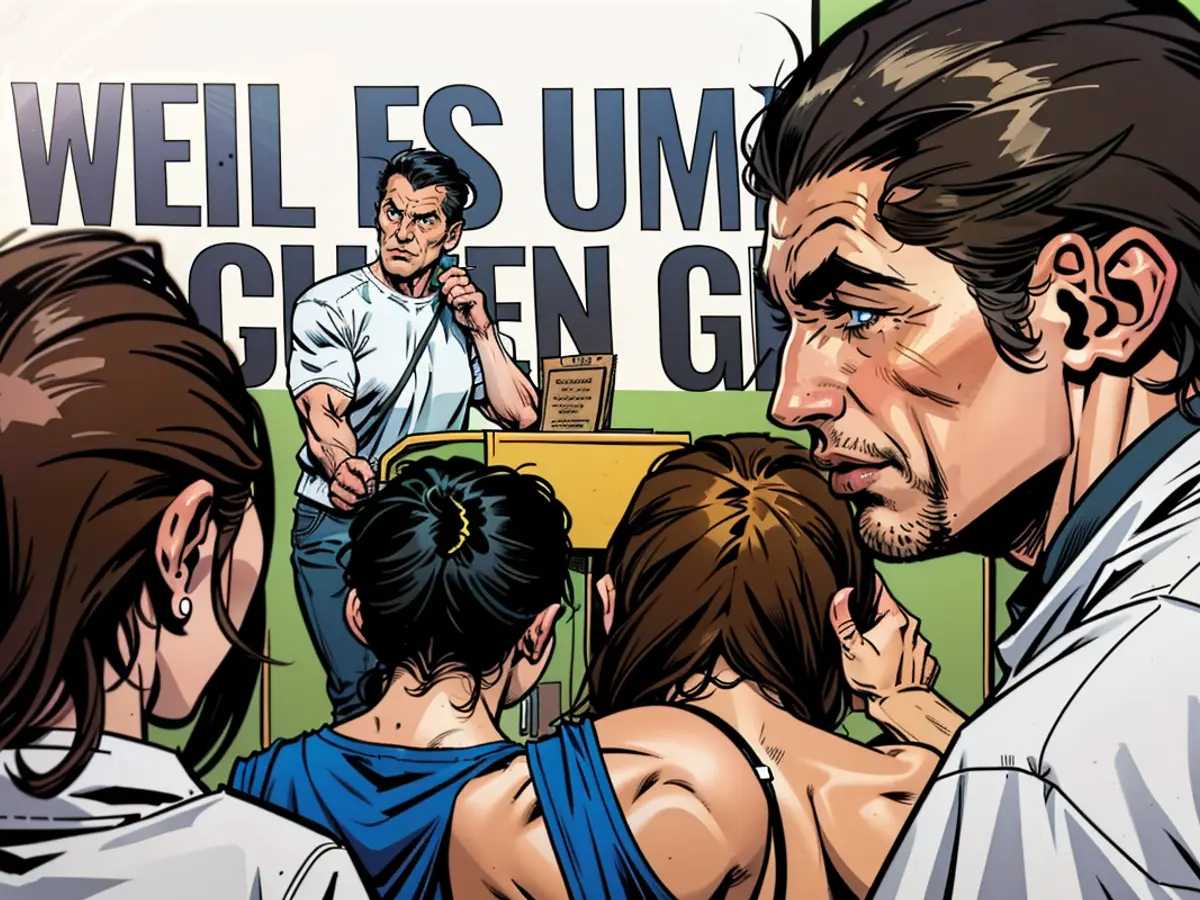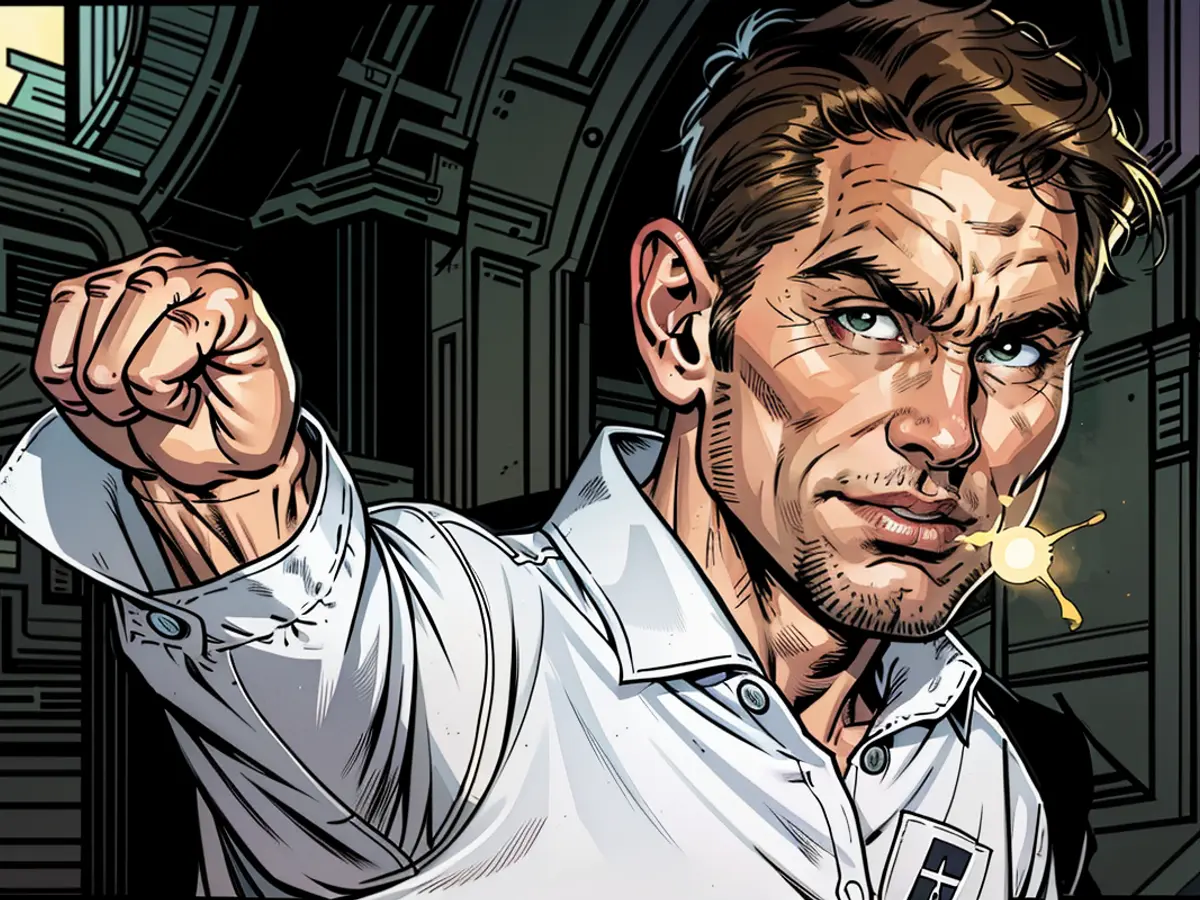At 23:29, Höcke manages to secure a position in the Thuringian Parliament
The AfD Scores Victory in 29 Out of 44 Constituencies in Thuringia, Yet Fails to Secure Government The Alternative for Germany (AfD) has emerged victorious in 29 out of 44 constituencies during the state election in Thuringia. Contrastingly, party leader Björn Höcke suffered a loss to the CDU politician Christian Tischner in the Greiz II constituency. Despite Höcke's defeat, the AfD's impressive second vote result of 32.8% ensures that it will secure additional seats in the state parliament beyond its direct candidates. Owing to this, Höcke manages to enter the state parliament through the state list, leading it. In a likely scenario, a successful AfD candidate would have had to relinquish their mandate in favor of Höcke.
Preliminary Result: AfD Wins in Thuringia, Coalition Talks Likely with Left, Greens, and FDP For the first time in a state election in Germany, the AfD has obtained the highest number of votes in Thuringia. The party's lead candidate, Björn Höcke, achieved a significant increase of 32.8% in votes. Due to the opposition of democratic parties, the AfD cannot form a coalition to rule, making it likely for the CDU to engage in coalition talks with the Left, Greens, and FDP.
Left Party Gains Direct Mandates in Saxony Despite Failing to Overcome 5% Hurdle In an unexpected turn of events, the Left Party secured two direct mandates in Leipzig during the Saxony state election. Despite not surpassing the 5% threshold according to projections, a peculiarity in the Saxon electoral system enabled the Left Party's entry into parliament. The alliance of CDU, Greens, and SPD, which was previously in power, is projected to no longer have a majority due to the Left Party's entry into parliament.
Green Party Leader Attributes Election Results to Migration and Ukraine Issues The Green Party leader, Omid Nouripour, views the results of the state elections in Saxony and Thuringia primarily as a consequence of the migration and Ukraine issues. Nouripour criticized the federal government for addressing these problems while damaging the coalition's reputation with unnecessary disputes.
Minority Coalition in Thuringia Comes to an End, Unusual CDU-BSW-SPD Coalition a Possibility The minority coalition of red-red-green led by Prime Minister Ramelow in Thuringia has come to an end. Given that no party is willing to form a coalition with the AfD, an unprecedented alliance of CDU, BSW, and SPD is seen as the most likely option for a government coalition in Thuringia. However, due to current projections, this constellation is currently lacking one seat to form a majority in the state parliament.
CDU Leader Mario Voigt Misses Direct Mandate in Thuringia CDU lead candidate Mario Voigt fell short of securing a direct mandate in the state election in Thuringia. Voigt received 37.4% of the first votes in the Saale-Holzland district II, placing him second behind the AfD candidate, Wiebke Muhsal. In contrast, Voigt had been elected as a direct candidate to the state parliament in the 2019 state election.
Preference for AfD Among Young Voters in Thuringia More than one-third of young voters in Thuringia opted to cast their ballots for the AfD, a party regarded as far-right by domestic intelligence agencies. According to a survey conducted by infratest-dimap for ARD, 38% of 18-24-year-olds in Thuringia voted for the AfD, followed by the Left Party with 16% and the CDU with 13%. Greens had the least support among young voters with 6%.
Michael Kretschmer Wins Direct Mandate in Saxony Saxony's Minister-President, Michael Kretschmer, emerged victorious in his constituency, obtaining a clear majority of 47.2% of the votes in Görlitz II. Despite Kretschmer's party performing poorly in his constituency with 34.2%, he comfortably surpassed the AfD candidate with 39.4% of the votes.

CDU Now Clearly Ahead in Saxony Projections Based on projections by both ARD and ZDF, the CDU is now comfortably ahead of the AfD in Saxony, with a 1.2% to 1.6% advantage. Initially, the Forschungsgruppe Wahlen had shown a close race between the CDU and the AfD, but the ARD projection exhibited the CDU maintaining an advantage throughout.
21:21 Thuringia: Ramelow's Wish for AfD's Suppression Unlikely to MaterializeThe Left party suffered significant losses in the Thuringian state elections, and Minister-President Bodo Ramelow appears set to step down. One of Ramelow's fervent hopes for the night - to prevent the AfD from obtaining a third of all votes - seems extremely unlikely to come true. The AfD has, in fact, achieved this, potentially blocking decisions requiring a two-thirds majority.
21:13 SPD in Single Digits, Klingbeil Stands by ScholzDespite the poor results for the SPD in the Thuringian and Saxon state elections, party leader Lars Klingbeil stated that Chancellor Olaf Scholz still has his support. Klingbeil made this clear during an interview with ZDF. He urged all party members to redouble their efforts to win back voters. "Everyone must now do their part to make things better," Klingbeil said.
21:02 FDP Deputy Leader Kubicki: "Traffic Light Coalition Has Lost Its Legitimacy"Following the poor results of the traffic light parties in the Saxony and Thuringia elections, FDP deputy leader Wolfgang Kubicki called for consequences for the federal coalition. "The election result shows: The traffic light coalition has lost its legitimacy," Kubicki wrote on Twitter. If a substantial portion of voters rejects the coalition in this manner, it must have consequences. Voters seem to believe that "this coalition is harming the country," Kubicki said. The FDP failed to surpass the 5 percent threshold in both state elections and is now projected to be just 1 percent away.
20:41 Thuringia: Höcke Fails to Secure Direct MandateThe district of Greiz II, where AfD faction leader Björn Höcke is running, has been counted: Höcke falls short of the majority of votes to directly enter the Thuringian state parliament. According to ntv information, the party will secure Höcke's seat in the state parliament. Another AfD MP is expected to waive their mandate in favor of Höcke.
20:37 Saxony: Left Party Likely to Exist in Parliament Despite 4-Percent LossIn the Saxony election, the Left Party is likely to remain in the state parliament despite its substantial losses. Although it does not clear the 5 percent hurdle with second votes and is currently projected at 4.3 percent by ZDF, two Left Party direct candidates in Leipzig constituencies are leading with a comfortable margin over the competition. Two direct mandates would be sufficient to secure the Left Party at least a few seats in the new state parliament. The potential winners of the constituencies could also secure a seat for the first places on their party's state list. This would mean that the current coalition of CDU, SPD, and Greens would not have a majority - Minister President Kretschmer would need the BSW for a governing majority.
20:28 Projection for Thuringia: AfD Continues to Gain StrengthIn the current ZDF projection for the election result in Thuringia, the AfD can further strengthen its standing. According to this, it reaches 33.4 percent of the votes. The CDU is at 23.8, the SWB at 15.5 percent. The Left Party is currently at 11.9. The SPD comes to 6.0 and the Greens reach 3.4 percent of the votes. The FDP does not manage to surpass 1.2 percent.

20:17 Projection for Saxony: CDU Lead Over AfD NarrowsAccording to the current ZDF projection, the CDU in Saxony only maintains a slim lead of 0.1 percentage points over the AfD. According to this, the Christian Democrats are at 31.5 percent, the AfD, classified as right-wing extremist by the constitutional protection agency, at 31.4. In Thuringia, the AfD has clearly surpassed the CDU according to the projections. The Greens are currently at 5.1 percent in Saxony and face the threat of losing their parliamentary seats. The Left Party has slim chances with a projected 4.3 percent. The SPD is assured of a place in the state parliament with 7.6 percent.
19:56 Thuringia: Höcke's Direct Mandate ImperiledThe direct entry of AfD faction leader Björn Höcke into the Thuringian state parliament is in grave danger. After 68 of 74 constituencies have been counted, the CDU candidate Christian Tischner is leading. He has a margin of 42.3 percent of the votes over Höcke, who is trailing behind with 40.4 percent. If Tischner wins the majority of votes in the Greiz II constituency, Höcke will not secure a direct mandate. He would then rely on a seat in parliament via the state list, which he leads in first place. However, if numerous AfD candidates emerge victorious as direct candidates, no one will secure a seat via the state list.
19:50 Höcke on AfD Success: "Firewall Policy Failed"In Thuringia, the AfD has entered the state parliament as the dominant force. "The firewall policy has failed," is Höcke's assessment of the election results. In an interview with ntv, he calls the result a "historic accomplishment" and discusses the upcoming government formation.
19:42 Ramelow: Left Party has been "devoured"Thuringia's Minister-President Bodo Ramelow sees two reasons for the "devouring" of his Left Party: "Firstly, a CDU that has consistently equated the AfD and the Left, creating an 'exclusion' atmosphere towards us, despite governing the land alongside us for five years," the head of government shared on ntv. Another factor for the Left's decline, according to Ramelow, is "a BSW announcing its intention to secure 17 percent of the votes for the AfD, and in reality, they have actually taken our votes." However, Ramelow can still celebrate the high voter turnout.
19:26 Nouripour on AfD's success: "Sympathies lie with those who are scared"The AfD is surpassing 30 percent in both Saxony and Thuringia, leaving the coalition parties far behind. Green Party leader Omid Nouripour views the AfD's election results as a "turning point" and a call to collectively defend democracy.
19:13 Latest projection for Saxony: CDU's victory becomes more dependentThe latest ZDF projection indicates the AfD and the CDU are neck and neck in Saxony: The Christian Democrats are only ahead with 31.7 percent, slightly leading the AfD with 31.4 percent of the votes cast. The BSW comes in at 11.4 percent, the SPD at 7.8. The Greens would be more securely in the state parliament with 5.5 percent, while the Left misses the five percent hurdle with 4.3 percent.
19:08 Wagenknecht aims for coalition with CDU and potentially SPD in ThuringiaBSW leader Sahra Wagenknecht is aiming for a coalition with the CDU and possibly also the SPD in Thuringia. "We very much hope that we will eventually form a good government together with the CDU - likely also with the SPD," said Wagenknecht on ARD. After five years of minority government, people desire a stable majority government that tackles concrete problems like "severe teacher shortages" in Thuringia. However, they also want a state government that "speaks up" in national politics - one that advocates for peace, diplomacy, and opposes the deployment of US missiles in Germany. Wagenknecht rules out coalitions with the AfD for Thuringia.

19:02 Latest projection for Thuringia: AfD improves results even furtherA ZDF projection for the election result in Thuringia shows the AfD more successful than initial expectations. According to the projection, the far-right party receives 33.1 percent of the votes in the state. The CDU is at 24.3, Sahra Wagenknecht's alliance achieves 15 percent from scratch. The Left, currently led by popular Minister-President Bodo Ramelow, loses nearly 8 percentage points and is at 11.7. The SPD gets 6.6, and the Greens 4 percent of the votes.
18:56 Goring-Eckardt: AfD's Victory is a "Democratic Surprise" in Germany
German Bundespoliticians are shaken more than the Green Party's election defeat in Thuringia indicates over the success of the AfD in Thuringia. Katrin Goring-Eckardt, the green Bundestag vice-president, sees the success of the right-wing extremists as a "surprise" in Germany. Party leader Omid Nouripour feels the pain of the failure of his own party as "negligible, considering that the AfD has become the strongest force in a state parliament."
18:48 Kretschmer on Saxony: "We Have Every Reason to Celebrate"
The incumbent Saxon Minister-President Michael Kretschmer views the CDU as a rock in the government coalition. "We have every reason to celebrate," said Kretschmer at his party's election party. "Behind us lie five tough years," the people in Saxony have trusted the CDU and not made a protest vote. "We know how disappointed the people are with what's happening in Berlin."
18:39 Projection for Saxony: CDU's Lead over AfD Shrinks
According to the initial projections on ZDF, the CDU's lead over the AfD in the Saxony state election has shrunk: The CDU is now only very narrowly ahead of the AfD with 31.9 percent to 31.3 percent of the votes cast. The BSW comes to 11.6 percent, the SPD to 7.8. The Greens would just make it into the state parliament with 5.2 percent, while the Left would be out with 4.5 percent.

18:33 AfD Leader Weidel Claims Government Participation for AfD
The leader of the AfD federal party, Alice Weidel, claims government participation for her party in Thuringia and Saxony. "Under normal circumstances, to stick to the practices in this country, the strongest party should be consulted, and that is the AfD," says Weidel on ARD, looking at Thuringia. "The voter wants the AfD to be involved in the government. We represent 30 percent of the voters in both federal states, and without us, a stable government is not even possible."
SPD Chief Secretary Kevin Kuhnert admitted his party's lackluster performance in Thuringia and Saxony elections. Referring to the ARD broadcast, he stated, "This isn't a night for celebration for the SPD." Over the years, the SPD has faced tough challenges, teetering on the brink of exiting the state parliaments. "Battling is essential," Kuhnert asserted, "We are indispensable." Kuhnert emphasized the need for change, acknowledging the necessity of more openness and attentiveness towards the electorate. When questioned about Chancellor Olaf Scholz, he proposed jointly explaining their politics.
18:23 Höcke Hails Result in Thuringia as "Historic Triumph"
AfD faction leader Björn Höcke regarded the Thuringia outcome as "historic." With the AfD topping the charts as the popular party in the federation, Höcke stated on MDR that the "stupid firewall nonsense" must cease. Change can only happen through the AfD.
18:21 Chrupalla Declares Victory in Saxony: "Even with the CDU"AfD party head Tino Chrupalla celebrated his party's result as remarkable, attributing it to public will that brought about a switch in politics in both federal states. Speaking to ZDF, Chrupalla revealed that the AfD is open to collaborating with all parties. "In Saxony, we are neck and neck with the CDU," he said, emphasizing their desire to govern for the betterment of Saxony.
18:17 Linnemann Rejects Coalition with AfD in Thuringia or SaxonyCDU Secretary-General Carsten Linnemann categorically dismissed any potential coalitions with the AfD in Thuringia or Saxony. He stated on ARD, "We're firm on this." The CDU will instead form governments from the center of parliament, demonstrating confidence that it will succeed. Linnemann described the CDU as the last viable option, highlighting the punishmentinflicted upon the traffic light parties.

18:13 Initial Projections for Saxony: CDU Leads Close to AfD, BSW at 12 percent, Greens on the EdgeThe inaugural projections for the Saxony state election indicate the CDU clinching a slight edge with 31.5% of the votes, closely trailing the AfD with 30%. BSW follows as the third force with 12%, while SPD remains in the state parliament with 8.5%. The Greens barely manage to enter with 5.5%, with the Left out with 4%, and the FDP absent from the new parliament.
18:10 Preliminary Results for Thuringia: AfD Leads CDU, BSW Secures 16%Early projections in the Thuringia state election depict the AfD taking a clear lead with 30.5% of the votes, followed closely by the CDU with 24.5% and the Left with 12.5%. The SPD maintains a presence in the state parliament with 7%, while BSW secures a seat with 16%. The Greens and FDP remain under 5%.
18:01 AfD Dominant in Thuringia, BSW Thrives in SaxonyFirst projections post-Thuringia state election show the AfD as the strongest force, as anticipated. The SPD surpasses the 5% hurdle, whereas the Greens and FDP fall short. In Saxony, the BSW triumphs with a double-digit result from the start. The CDU retains a slim lead over the AfD as per the projections. According to the data, the Left and FDP will not enter the state parliament, while the Greens persist.
17:18 Höcke Faces Possible Exclusion from Upcoming State ParliamentIn Thuringia, AfD faction leader Björn Höcke's seat in the future state parliament is uncertain. His successful colleagues pose a threat. Many potential AfD candidates in the constituencies are poised for direct election victories. Höcke, however, faces strong competition from the CDU candidate Christian Tischner in his Greiz II constituency. Should Tischner emerge victorious and the AfD earn more direct mandates than their allotted number due to the second vote result, no one can enter through the state list, not even from the leading position, which Höcke holds. In the event that this situation arises, the AfD might attempt to convince a successful direct candidate to relinquish their state parliament seat, thereby ensuring Hopke obtains a mandate.
16:48 Likelihood of No Media Coverage at Thuringia AfD Election CelebrationThere is a high probability that there will be no media coverage of the Thuringia AfD's election party. Classified as right-wing extremist by the domestic intelligence agency, the party attempted to ban specific media outlets from the event. However, a court intervened, prohibiting the exclusion, leading the state party to restrict all press access. Party spokesman cited logistical issues, citing insufficient space at the venue for the media representatives who had applied for accreditation.
15:52 Höcke votes at Lada - Ramelow with spouseThuringia's AfD state leader and main candidate, Björn Höcke, voted at noon. The 52-year-old Höcke visited his polling station in Bornhagen, Eichsfeld district, arriving in a Lada Niva, a popular Russian off-road vehicle. On the other hand, Minister-President Bodo Ramelow voted in Erfurt's state capital, accompanied by his wife, Germana Alberti vom Hofe. Ramelow, 68-years-old, has been leading the Free State's government since 2014, most recently leading a minority coalition.
15:38 Higher voter turnout than previous timeIn Thuringia, 44.4% of the voters had cast their ballots by 2:00 PM, representing a plus of more than two points compared to the last vote five years ago. This signifies a high voter turnout, with mail-in voters yet to be factored in. Saxony's turnout was also slightly higher than in 2019, at 35.4%. However, the election commissions anticipate significantly more mail-in voters than in 2019. Both states will close their polling stations at 6:00 PM.

15:06 "Kretschmer hopes coalition parties make it into the state parliament"
14:36 Key issues in Saxony and ThuringiaAccording to a large survey, around one-third of voters in Saxony and Thuringia plan to vote for the AfD in the upcoming September 1st elections. The survey reveals why this happens, emphasizing the major concerns and challenges. Migration is but one of them.
14:06 Höcke doesn't linger at the polling stationBjörn Höcke, the AfD's main candidate for Thuringia's state elections, cast his vote around midday. He didn't spend much time at the polling station in Bornhagen and declined to speak to journalists on site. Previously, Höcke always lost to the CDU candidate in his Eichsfeld district, prompting him to run in the Greiz constituency. Regardless, defeat against the CDU is a possibility there as well.
12:46 Thuringia's voter turnout similar to 2019's midday marksIn Thuringia, voter turnout is shaping up to be identical to the previous parliamentary election. According to the election commissioner, approximately 32% of eligible voters had cast their ballots in the polling stations by 12 PM, with mail-in voters unaccounted for. At the same time, voter turnout in the 2019 state election was 31.2%. There has also been more interest in the state election than in the European and local elections held earlier this year, with 24.3% of eligible voters participating.
12:18 High voter turnout anticipated in SaxonyIn Saxony, a high voter turnout is anticipated for the state election. At noon, 25.8% of eligible voters had cast their ballots, according to the Statistical State Office in Kamenz. Similar figures were reported during the 2019 state election, with a slightly higher percentage at 26.2%. Mail-in voters have yet to be included in the preliminary numbers. The estimated percentage of voters exercising their right to vote by mail is 24.6%, up from 16.9% in 2019. The election office reported that the elections have been progressing smoothly without any disruptions.
11:58 von Lucke: Election result could weakened Berlin coalitionThe election outcomes in Saxony and Thuringia have yet to be determined. According to political scientist Albrecht von Lucke, if the SPD fails to enter the state parliament, it would be "almost like an earthquake." In an interview, he analyzed the election and its possible implications.
11:26 Police are investigating a threat in a polling stationPolice in Gera are investigating a threat made at a polling station. A man, sporting an AfD T-shirt, entered the polling station to cast his vote in the morning. The polling station manager asked the man to remove the shirt, as it was prohibited party advertising within the polling station. He complied, but expressed dissatisfaction with his treatment upon leaving the premises, threatening to return. Police took a statement and reprimanded him. Moreover, police in Erfurt are investigating graffiti ("Höcke is a Nazi") near polling stations as instances of criminal damage.

11:10 Correctiv warns of circulating false newsCorrectiv research network has raised concerns regarding a false news story circulating once more. It claims that signing the ballot paper protects against vote tampering. However, the Federal Returning Officer's office confirmed to Correctiv that "the ballot paper must not be signed by the voter, as this endangers the secrecy of the vote, thereby invalidating the entire ballot paper."
10:29 Voigt hopes for "stable majority ratios"Thuringia's CDU top candidate Mario Voigt also cast his vote. He expressed hope "that many Thuringian women and men will go to the polls and exercise their right to shape the future of our state." He also expressed his hope for "stable majority ratios" to enable the state to progress once again.
11:25 Sonneberg Experiences surge in Extreme Right ThreatsSonneberg is the first district in Germany governed by an AfD politician. Since then, activists have reported experiencing severe harassment, causing several individuals to resign from their jobs. Moreover, reports suggest a drastic fivefold increase in extreme right-wing attacks within a year. Experts correlate this trend with the AfD district administrator.
10:57 Kretschmer's Statement at the Ballot BoxSaxony's Prime Minister Michael Kretschmer considers the state election in his jurisdiction as "likely the most critical election in 34 years." After casting his vote in Dresden, he thanks those who initially voted differently but have subsequently supported the "significant force in the mainstream center," referring to the Saxon Union. "This shared understanding will facilitate a government formation that serves this region," Kretschmer added. In current polls, his CDU is locked in a tight race with the AfD.
10:30 Ramelow's Stand on Minority GovernmentFor Thuringia's Prime Minister Bodo Ramelow, election day translates into a "celebration of democracy," despite the potential risk of not being re-elected. In an ntv interview, the Left Party politician discussed his reasons for not advocating for a minority government and his doubts over the competence of the BSW.
09:59 Historian Criticizes Election DateHistorian Peter Oliver Loew criticizes the election date for the state elections in Saxony and Thuringia on the 85th anniversary of the German invasion of Poland in 1939. "Individuals who thought scheduling elections on September 1st were a good idea didn't have a great sense of history," Loew told Redaktionsnetzwerk Deutschland (RND). When considering the AfD, labeled as "secured right-wing extremist" by both states' domestic intelligence service, Loew said: "This can lead to very discomforting connections if the party wins in Dresden and Erfurt, whose relationship with the Nazi era is unclear."
09:30 "Critical Election": All Data for the Saxony State ElectionOver 3.3 million eligible voters in Saxony cast their ballots today to determine whom they'd like to steer the Dresden state parliament's future political course. The CDU may no longer secure the top spot in the state for the first time since 1990. Saxony's Prime Minister Michael Kretschmer calls the election "crucial." "Everything hinges on it."

09:05 Kretschmer Speaks on Refugee Debate, Traffic Light Government, and Ukraine WarOn election day in Saxony, will Michael Kretschmer continue the CDU's winning streak in the state? In an ntv interview, Kretschmer discusses his stance on the refugee debate, the traffic light government, and the Ukraine war.
08:46 Thuringia Election DataToday, electoral duty call in Germany's heartland: the fight for the power to govern the federal state of approximately 2.1 million inhabitants for the next five years commences. Will the AfD, with top candidate Björn Höcke, become the strongest force in Thuringia?
08:24 The Threat to Democracy from the AfD's GrowthPolls indicate that the AfD could gain substantial influence in the upcoming elections in Saxony and Thuringia. For democratic institutions, this development is concerning, as a research group has pointed out. People may overestimate our rule of law's robustness.
08:00 Polling Stations Open in Thuringia and SaxonyToday, new state parliaments will be chosen in Thuringia and Saxony. According to polls, the AfD holds a considerable lead in Thuringia. In Saxony, the CDU led by incumbent Prime Minister Michael Kretschmer and the AfD are locked in a tight race. Initial projections are expected at around 18:00, when the polling stations close. The elections in these two eastern German states serve as a gauge for the traffic light coalition in Berlin.
For the current red-red-green coalition in Thuringia led by Prime Minister Bodo Ramelow (Left), there is no majority in the polls. A potential post-election option includes a government consisting of the CDU, the Alliance for Progress and Renewal (APR) led by Sahra Wagenknecht, and the SPD. In Saxony, the fate of the coalition between CDU, SPD, and Greens remains uncertain. Kretschmer does not rule out an alliance with the APR. The Left party faces the risk of being expelled from the parliament in Saxony. The same fate may befall the Greens and FDP in Thuringia.
The Green Group, despite not having a direct candidate in Thuringia, could potentially gain seats in the state parliament through the state list, as the AfD's impressive second vote result ensures additional seats beyond their direct candidates.
In contrast to the Green Group, the Left Party in Saxony managed to secure two direct mandates in Leipzig, despite falling short of the 5% threshold, thanks to a unique electoral system in Saxony.








